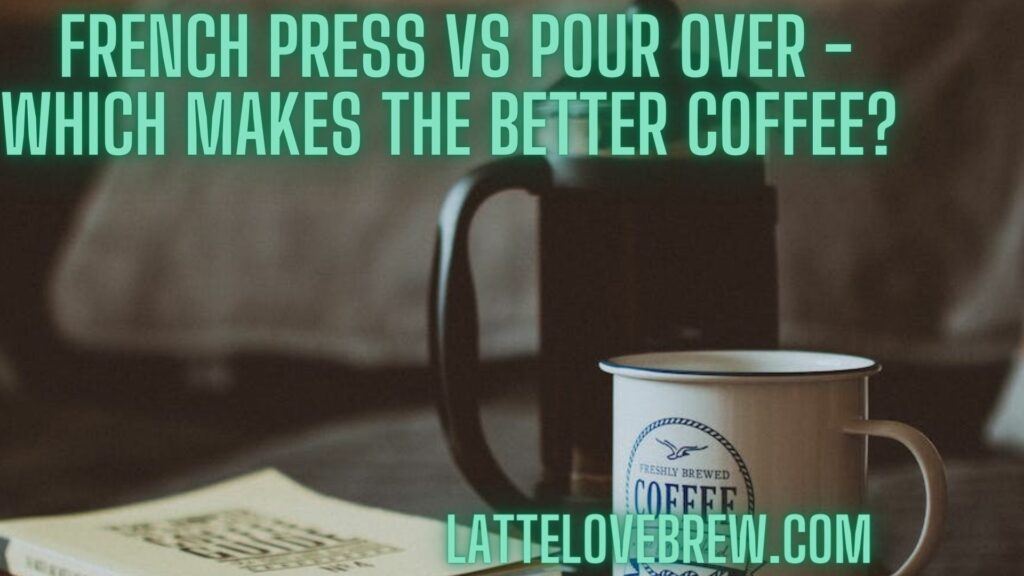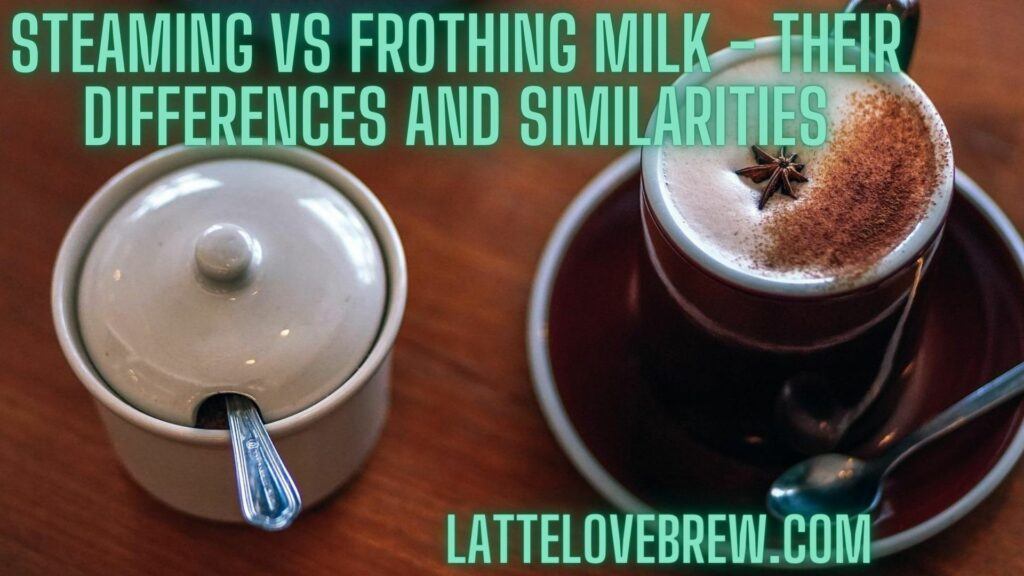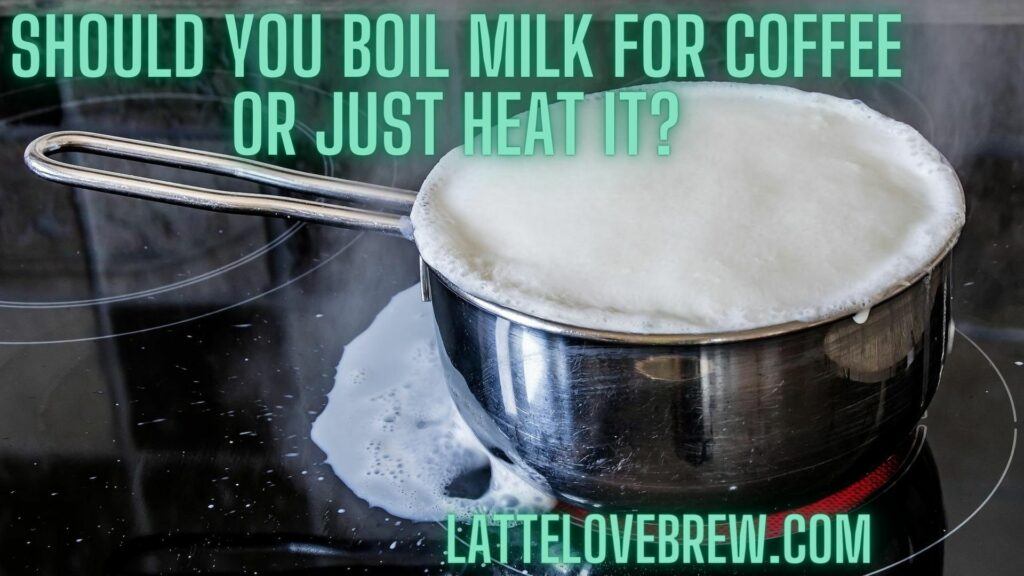Last updated on January 22nd, 2024 at 13:17
When it comes to manual coffee brewing it is good to have a good French press Vs Pour over comparison and consider the two brewing techniques from all angles before you decide which is best for you and why.
Often to get the best possible cup of coffee it comes down to using the right beans with the right brewing technique to get the best cup of coffee.
Keep reading to find out when to use a French press and when to use a Pour over and why.
French Press Vs Pour Over – Let’s Talk About The French Press
Table Of Contents
- 1 French Press Vs Pour Over – Let’s Talk About The French Press
- 2 What Does French Press Coffee Tastes Like?
- 3 The Advantages Of A French Press Coffee Maker
- 4 French Press Vs Pour Over – Pour Over Method
- 5 What Does Pour Over Coffee Tastes Like?
- 6 The Advantages Of Pour Over Coffee
- 7 What About A Chemex Pour Over Coffee?
- 8 French Press Vs Pour Over Caffeine Content
- 9 French Press Vs Pour Over Health Benefits
- 10 Frequently Asked Questions About French Press Vs Pour Over
- 11 Final Thoughts – French Press Vs Pour Over
A French press goes by many different names including:
- Coffee press.
- Plunger coffee.
- Cafetière.
There are only three parts to this popular coffee brewing device: An open-topped cylindrical glass (the carafe), the plunger and a stainless steel coffee filter.
It is a popular brewing method that uses the full immersion method of extracting the flavor compounds and oils from the coffee grounds.
The device has been in use since 1929 and, ironically does not originate in France but in Italy and is a popular and very affordable coffee maker with coffee lovers from all over the world.
It is very easy to use, almost effortless. Simply add your coffee grounds to your French press, give the carafe with coffee grounds a light shake to ensure an even distribution of your grounds and add your hot water.
When the extraction process has finished, press the plunger down evenly and with a consistent pressure.
Pour your coffee and enjoy.

Read: Why is a French press better
What Does French Press Coffee Tastes Like?
A French press produces a great cup of coffee with a very distinctive flavor and taste that coffee drinkers enjoy.
- It is rich and bold. Brew time is approximately 4 minutes and creates a great, bold tasting, dense cup of coffee. It is not always a method that makes it easy for the coffee drinker to identify and pick out the subtle and nuanced flavors of the beans. The overall taste is confident and bold.
- The final brew has a heavy body. The metal coffee filter unfortunately allows a tiny amount of the smallest grounds through into your cup of coffee when it needs replacing, which results in a heavy feeling. Also, the ability of this brewing method to extract the oils contributes to the heavy body.
- The acidity is muted. This brewing process and the tiny grounds that make their way into your cup results in the effect of pressing the mute button on the natural acidity of the coffee grounds. There is less zest to the coffee.
The tiny coffee grounds that make their way into your coffee are rare and generally only a small amount make their way into your cup. It’s not something that will bother you and only happens when it is time to replace the filter, which can take a few years, depending on how often you use it.
The Advantages Of A French Press Coffee Maker
If you have the preference for a rich, bold and strong tasting cup of coffee then you will enjoy brewing coffee with this device.
Due to the technique of using full immersion you can extract significantly more of the oils from the coffee during brewing, resulting in a coffee that is more intense and full-bodied.
You can easily adjust how your coffee ends up tasting due to having full control over the brewing temperature, grind size and brew time.
Adjusting those variables you can make your coffee stronger or weaker.
Like all coffee brewing equipment, it is easy to clean but takes practice. You simply take it apart, which can be annoying and inconvenient for some.
A drawback are the few coffee grinds that do make their way into your brew when it is time to change the filter.
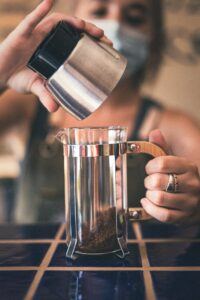
Read: Pour over Vs French press
French Press Vs Pour Over – Pour Over Method
The pour over coffee brewing method requires the pouring of hot water over coffee grounds using a gooseneck kettle – or better still, a gooseneck kettle with digital temperature control.
The coffee grounds are placed in a cone shaped coffee filter. You then wet the coffee grounds and wait for 25 to 30 seconds while they bloom. Then continue with the pouring of water on your grounds.
The finished brew is fresh, bright and very smooth. The type of filter that you use will affect how the coffee will taste.
- Paper filter: Clean crisp taste.
- Metal filter: Fuller taste that is slightly bolder.
- Cotton filter: A middle ground coffee that is in between the paper and metal filter.
The reason behind the difference in flavor between the three types of filter is due to the amount of coffee oils that get filtered out. With a metal filter filtering out none of the oil and a paper filter all of the coffee oil and a cotton filter just some of them.
What Does Pour Over Coffee Tastes Like?
This brewing process produces a coffee that has balanced and more rounded flavor than French press coffee.
- It is nuanced and clear. The shorter brew time and a paper filter work well together to produce a cup of coffee with great clarity in flavor and allow you to taste the coffee’s unique and nuanced flavors and lingering aromas.
- It is clean and light. A pour over has a good clean taste, no matter what kind of filter you are using, be it a paper filter, metal filter or a cotton filter. Great, smooth coffee.
- It is light and bright. A pour-over coffee has all the bright tasting natural acids in the coffee, the juicy flavors.
This is a brewing process where every cup of coffee that you brew will be slightly different, not a lot, but slightly different due to it being a very manual coffee brewing technique.
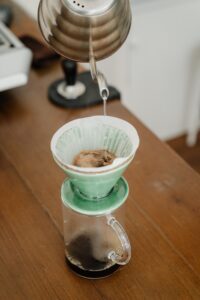
The Advantages Of Pour Over Coffee
The distinct advantage of pour coffee is its ability to extract more of the coffee soluble compounds into the hot water while brewing. The result of this is getting more of the flavors into your cup of coffee.
The cup of coffee produced is not as intense and is perfect for brewing your specialty grade coffee beans and especially your single origin coffee beans as the process extracts all the nuanced and unique coffee flavors from the origin.
The brewing equipment is one of the easiest to clean; you don’t need to take anything apart.
A clear drawback is the time taken to make a coffee with this method and the greater amount of effort required.
What About A Chemex Pour Over Coffee?
The distinctive Chemex coffee maker, invented in 1941, is a stand-out pour-over coffee maker due to the hourglass body and wooden collar at the neck.
To use this coffee maker you need to use their own design of paper filter which are thicker than regular filters and produce a smooth and very well-rounded cup of coffee.
The grind size to use is a medium-coarse grind.
The brewing technique and method for a chemex is the same as a regular pour over coffee.
French Press Vs Pour Over Caffeine Content
There is the misconception regarding coffee where coffee drinkers falsely assume that the stronger the flavor the more caffeine it has.
This is not the case. The extraction of caffeine is more complicated than that. The caffeine content in a pour over coffee is higher than that of a French press.
For a 12 ounce (360 ml) a pour over has 175 mg of caffeine while a 12 ounce (360 ml) cup of French press has 135 mg.
French Press Vs Pour Over Health Benefits
There is not a lot of difference between these two coffee brewing methods when it comes to which is the healthiest.
Both are as healthy as each other with one caveat – if you use a pour over with a paper filter it is slightly healthier due to the ability of it to filter out coffee oils meaning less Cafestol gets into your coffee. Cafestol is unfortunately associated with cholesterol.
Frequently Asked Questions About French Press Vs Pour Over
What Is Better A Pour Over Or French Press?
Which is better is subjective and a matter of opinion and personal taste and what kind of coffee you enjoy.
A French press is great for those that enjoy a bold coffee with rich tastes and aromas. Then using a dark roast bean in a French press will get better results than a pour over.
If you enjoy a smooth coffee with the pleasant flavors of the origins, then a lighter coffee, a light roast is better extracted with a pour over than a French press. Sometimes, it is about using the right brewing method with the right beans.
Does Pour Over Have More Caffeine Than French Press?
Yes, a pour over coffee is better at extracting caffeine from the coffee grounds than a French press. This is easily demonstrated when you make a coffee using the same beans with the only variable changed being the brewing method.
On average, a pour over coffee has 175 mg per 12 ounce (360 ml) cup while a French press of the same size has 135 mg on average.
Why Is Pour Over Coffee So Good?
With pour over coffee you have full access to all the variables that control how your coffee will taste and can control them. Coffee lovers and coffee enthusiasts love pour coffee as it is a method that allows you to control the temperature, contact time that the water has with the coffee grounds, and grind size.
Ultimately, it is one of the few methods that gives you full control over the whole brewing process.
Can You Use Regular Grounds For Pour Over Coffee?
Yes, you can use any coffee for making a pour-over coffee. With the additional effort required to brew a pour-over coffee, you will get a better end result when you use high quality coffee grounds, preferably specialty grade or single origin beans. You will get better results when you use a medium or medium-coarse grind.
Why Does My Pour Over Coffee Taste Bitter?
If your coffee tastes bitter when using the pour over brewing technique you will need to adjust your technique as you are dissolving too much organic coffee compounds.
There are a few adjustments that you have to look at and consider adjusting. Here is what you can do:
- Use a slightly lower brewing temperature.
- Use a faster pour rate to ensure less contact time between water and coffee grounds.
- Adjust the grind size and use a slightly larger grind.
Make only one change at a time. If the change does not fix the overtly bitter coffee, try another adjustment.
Can You Reuse Pour Over Coffee Grounds?
Yes, you can always re-use coffee ground for multiple purposes like garden fertilizer, keeping pest like ants and mosquitos away, a facial scrub, adding nutrients to your compost.
Unfortunately, you can’t reuse them to make a second cup of coffee. As a matter of fact, if you try it, and you can make a good cup of coffee from your reused grounds it is a sign that you are not extracting all the flavor compounds and oils into your initial cup and that you can make a better and more flavorful first time brew.
Final Thoughts – French Press Vs Pour Over
When it comes down to the coffee brewing batter of French press Vs pour over is not really a battle of which is best or which produces the better tasting cup of coffee.
There are some beans, like a medium-dark and dark roasts are better for a French press where the lighter roasts and specialty grade beans are better brewed with the pour over technique.
Your choice will also depend on what type of coffee you enjoy; if it is bolder coffee with more dominant strong tastes. If you enjoy those lighter and brighter flavors, go for a pour over.
Which do you prefer – a Pour over or a French press?
Join our online coffee community on Facebook/Meta and share your French press or pour over coffee creations, selfies, and coffee images.

